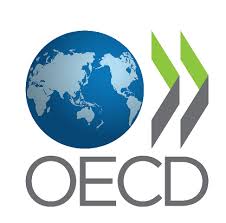24th September 2014
What’s next at the OECD? Exploring New Horizons
It’s the seventeenth anniversary of my first visit to the OECD. Back in September 1997 I accompanied my Treasury colleague Tom Scholar (now our Prime Minister’s G8 and G20 Sherpa) to Japan’s Economic Survey meeting, as I was about to take up my first diplomatic posting in Tokyo.
It was one of the best days of training of my life. I’m still in touch with some of the Japanese Government economists and OECD staff I met that day. I remember finding the OECD report a more useful general summary of the Japanese economy than the IMF’s Article IV. I can’t remember how good the Organisation’s predictions were (!) but over in Tokyo I was quickly immersed in analysing the Asian Financial Crisis and advising on the UK and global implications of Japan’s own full-blown banking crisis.
Coming full circle, here I am back at the OECD as British Ambassador. I had no idea in 1997 that the Economic and Development Review Committee I attended that day was just one of up to 200 OECD committee processes the UK Delegation was tracking. Most of these continue in one form or other to this day, alongside large new areas of activity such G20 work, key non-member country relations, and so on.
Looking across that spectrum of issues, what are some of the most important areas of interest for the UK in the months to come?
Certainly it’s worth dwelling first on international tax. This work has unquestionably boosted the OECD’s profile and reputation globally. News of major multinationals paying relatively little or even no tax has hit the headlines continuously in recent years. Last week’s OECD proposals on Base-Erosion and Profit Shifting (BEPS) are a significant first step towards achieving greater tax justice, especially for poor countries. The UK Chancellor has called them a “once in a century” opportunity.
This hasn’t always been a straightforward issue for the UK but the Prime Minister and Chancellor have been determined to lead the debate internationally. The European Commission estimates that Europe haemorrhages 1 trillion Euros of tax revenue annually through evasion and avoidance – imagine what you could do in health and education with just a slice of that money. My job is to ensure we sustain the political support for the hard-working OECD team.
The question of sustaining political will brings me to another vital area of OECD focus: global climate change. The UN Conference of Parties (COP) meets in Paris in November 2015 to agree binding emissions reductions. As I said in a previous blog, the OECD, IEA, NEA and ITF must contribute to that meeting with simple and compelling economic evidence of the key areas where policies need to be better aligned. Rich Trumpka hit a bit of nerve at the OECD Forum this year with his “Monday OECD says this, Tuesday OECD says that…” but his remark was a fair challenge to the Organisation to ensure all its advice is internally consistent and supportive of the over-arching goal of inclusive and sustainable prosperity.
There is so much more I could mention: the nexus of investment, competition, trade and regulatory issues; the central theme of ‘innovation’ and upcoming update of the OECD’s Innovation Strategy; big discussions on the future of ODA; on critical energy trends and partnerships; and the cross-cutting New Approaches to Economic Challenges (NAEC) project about which I have also blogged in the past.
For me NAEC is an exciting opportunity to genuinely challenge our conventional wisdoms and develop truly fresh, integrated ways of working. It is only by embedding a culture of challenge and innovation of the OECD’s analytical frameworks, that we will ensure the Organisation’s work remains relevant in an increasingly globalised and complex world.
